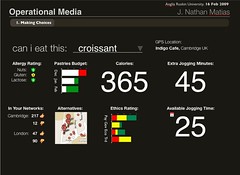Operational Media Online
February 2010
How do we design for decisionmaking, and how does that media shape our decisions? (lecture and website)
In February 2010, I was inivited by the Anglia Research Centre in Digital Culture, to give a talk on what I called "Operational Media," information design which is used to make all sorts of decisions:

- what to purchase
- how to use our time
- how to respond to unfolding combat situations
- how to vote
I gave examples of design trends, relating them to business, the open government movement, and computer science. I also highlighted relevant skills for students who want work in this area.
During the lecture, I made available a companion site with additional sources and ideas.
- Lecture companion website
- Jussi Parikka blogged about my talk. He said:
Nathan's talk was able to introduce the general idea of computer assisted information retrieval and management which to me was a great way of branding a variety of trends into "operational media". He talked about visualisation of data, augmented reality, filtering of data, expert, crowd and computer assisted information gathering, and a variety of other contexts in which the idea works.
The talk was in providing [sic] really good material on the intertwining of such (bio)political questions in (online) media design.